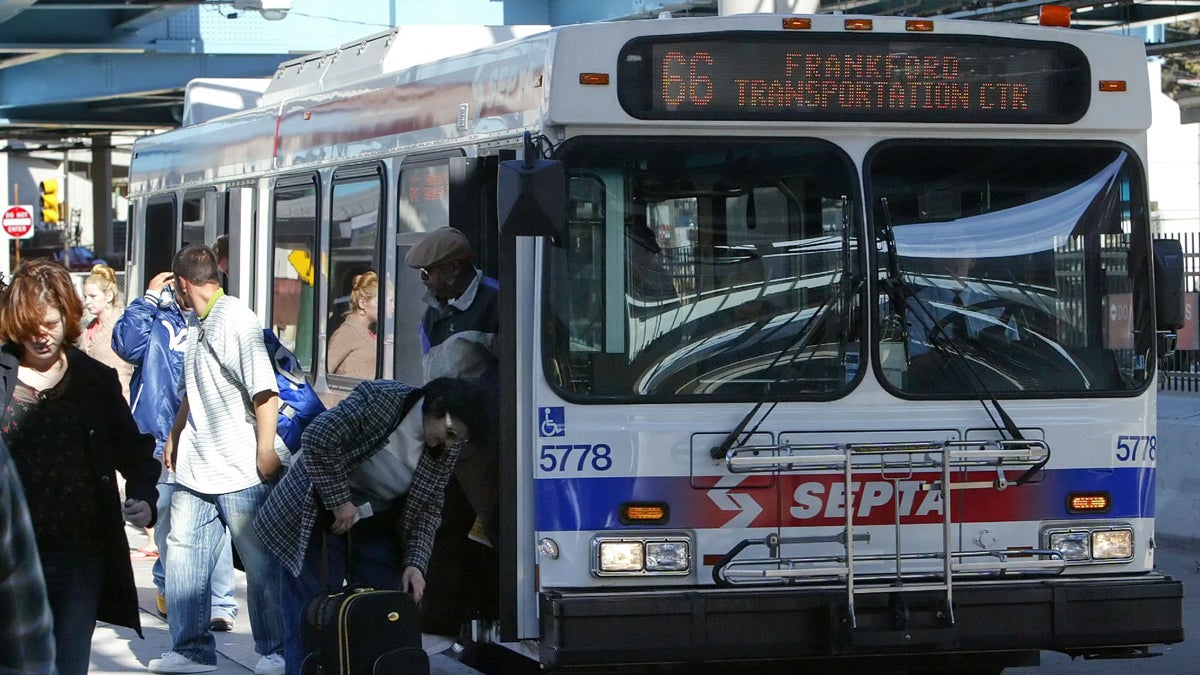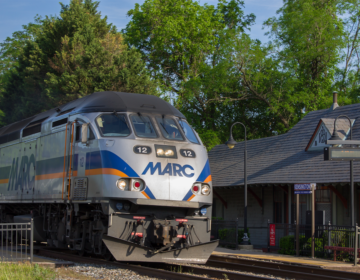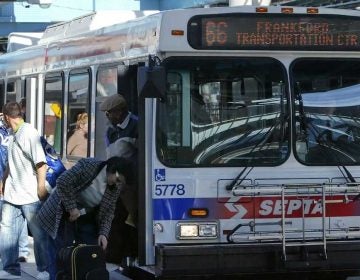Detroit’s transportation agency just eliminated its transfer fee. Will Philly be next?
SEPTA is mulling the elimination of its $1 transfer fee for switching transit lines.

Commuters are shown exiting a SEPTA bus. (Joseph Kaczmarek/AP Photo)
This story originally appeared on PlanPhilly.
—
SEPTA riders may soon be able to stop giving a buck.
City Councilwoman Helen Gym wants SEPTA to stop charging riders a $1 transfer fee for switching transit lines and at a budget hearing on Tuesday she made that desire known.
“I’ve long thought of transit as a public good in which low-income Philadelphians should be able to access transit or not have to spend more proportionately than our wealthiest folks to ride it,” said Gym.
It wasn’t the first time Gym has made her opinion known. But within SEPTA, there may be a growing appreciation for the concerns she and others have raised.
“I’m convinced that we will find an ability to reduce and potentially eliminate the transfer fee,” said Mike Carroll, deputy managing director of the city’s Office of Transportation, Infrastructure, and Sustainability and a SEPTA board member. “But it’s going to take work from the city and from SEPTA to really think through what the network looks like and also what the true revenue implications are in a comprehensive way.”
A fare increase is scheduled for 2020 but with the increase, there is an opportunity to consider other concessions to keep rides affordable, said Jeffrey Knueppel, SEPTA’s general manager.
But that is only if the agency can find another way to earn the $12 million in annual revenue that currently comes from transfer fees — and that’s a big if. SEPTA can’t afford to lose any income, especially not at a time when state funding is hovering at record lows, Knueppel said.
“We do understand it,” he said of the equity issues created by the transfer fee. “But it does create a situation for us in that we want it to be neutral in terms of cost to SEPTA. Because if we lose income, we have to reduce service and we don’t want to do that.”
Scott Goldstein, policy director for Transportation for America, a national transportation advocacy group, said charging a fare is enough. An additional fee to travel creates a hurdle for some and can reduce the economic value of a community.
“Anytime you increase the fee burden, you’re making that transit a little more difficult to access and you’re perhaps exacerbating some of the problems that we should be addressing through transit,” said Goldstein.
Other big cities have done away with transfer fees or reduced their use.
New York City’s Metropolitan Transportation Authority allows free transfers for up to two hours with a MetroCard. Bus fares paid in exact change can transfer between intersecting buses.
On Houston’s Metro, transfers are free for riders with fare cards. Detroit’s transit agency just eliminated its transfer fees.
If Philadelphia follows suit, SEPTA’s ridership could benefit, Gym said. SEPTA is battling declining bus ridership as travelers weigh new options including van-like “pool’ rides from Uber and Lyft that the companies have subsidized to compete with transit.
“It is about stopping the significant decline in ridership and making sure we’re reversing a trend that seems to be not only persistent but potentially could grow in terms of a gap,” Gym said.
WHYY is your source for fact-based, in-depth journalism and information. As a nonprofit organization, we rely on financial support from readers like you. Please give today.







